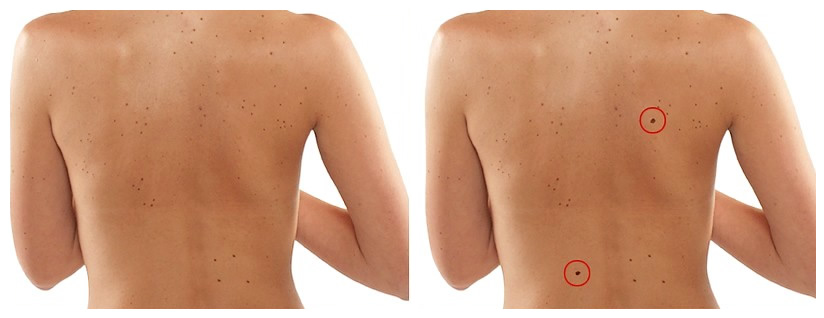The advent of microscopic digital photography for recording and comparing mole patterns has transformed screening. Mole mapping in our London clinic is based on visual, immediately audited information, rather than relying on paperwork, or still images in a file.
Dedicated software can flag up issues, although the real advantage lies in detail available to our experienced consultant dermatologists. All appointments are consultant led, they review each session with you in detail.
Even though skin cancer is increasing, treatment has advanced at an equal rate. This is still more effective following early detection, from approaches such as mole mapping.
Detecting Key Changes

To illustrate how new moles can be picked up by monitoring change over time, we chose images of a clear case. The technology we use can however pick up variations which are barely perceptible to the naked eye.
New moles in adulthood shouldn’t be an immediate concern, although they can indicate cancerous growth. They deserve to be checked by a specialist, who will also assess change in size, shape, or colour of existing moles.
Moles can be flat, raised, rough, or smooth and vary from almost invisible, to dark brown. Most are harmless, although the few which are not warrant attention. Whilst we appreciate that nurse led imaging is available elsewhere, a consultant’s opinion matters.
Apart from the benefit of early skin cancer detection, mole mapping can also pick up other skin conditions, which could become unsightly, uncomfortable, or dangerous.
Occasionally, moles can develop into malignant melanoma, an aggressive form of skin cancer which warrants speedy diagnosis and treatment. Moles developing in adulthood, or a family history of skin cancer are indicators but nobody is immune.
A Friendly Procedure
Visiting our London clinic for mole mapping is straightforward. This starts with an initial, half hour screening. Your results are studied by a consultant dermatologist, who will meet with you for a private consultation.
If there are no abnormalities, an appointment can be made for your next screening. A visit every six to twelve months is fine in most cases.
The total body scan will have mapped all the moles on your body, creating a digital image which is recorded alongside information from you. This will include any symptoms, such as changes observed, itchiness, tenderness, or other concerns you have.
After each scan, the images are instantly compared with previous images, to detect often subtle changes. This provides high accuracy for identifying melanomas, or other conditions and helps avoid unnecessary treatment of innocent moles.
Long Term Security
Incidentally, your images and details are encrypted, so they are secure but the real point we have in mind is the security of your health.
If abnormal symptoms are picked up, mole mapping will have ensured this happened at a quite early stage and an effective treatment plan can be put in place. Most abnormal mole removal is by simple excision.
Treatment is carried out by consultant dermatologists. The service we provide is part of our overall support as a leading London dermatologist. Our mole clinic is just one important aspect of providing lifetime care.
We see mole mapping as a partnership with you, monitoring your wellbeing over the years, offering peace of mind as well as expertise. Should any issues occur, there is ample time to discuss options carefully.
Patient Care & Support
Any change in a mole is important, perhaps where one suddenly differs from others. Picking up these changes is vital and monitoring moles can be individually tailored.
You are welcome to read more on the variety of techniques we provide for mole monitoring and melanoma diagnosis, along with approaches to self checking. We create the best plan for your needs, although mole mapping is a core approach.
We get to know you, experienced dermatologists are keeping a close eye on your long term health. You can discuss any concerns about your skin and our staff have the opportunity to spot issues beyond moles.
Skin cancer treatment at our London clinic should be about preventing the development of conditions, as well as cure. Safeguarding health is part of supporting patients.
Arranging a visit is straightforward and you can choose from convenient locations, or the time of day you wish to attend. We look forward to meeting you.
You may find the options below useful:
- Save time with an intuitive search on: Skin Cancer Diagnosis & Treatment.
- Up to date news, research and insights: Our Dedicated Skin Cancer Blog.
For any advice, or to arrange a dermatology appointment, call 020 8441 1043, or send an email via the Make An Appointment button below.
